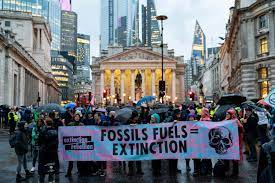The following article written by Jasmin Orden for The Canary outlines the reasons for the actions taken by Extinction Rebellion targeting The City.
EXTINCTION REBELLION IS TAKING TO THE CITY
Extinction Rebellion (XR) is currently protesting across London as it aims to “target the root cause of the climate and ecological crisis – the political economy”.
The “Impossible Rebellion” began in Covent Garden on 23 August, and is scheduled to continue for the next two weeks. One of its targets will be the City of London, otherwise known as London’s financial district. The protests intend to disrupt a sector of the UK economy that is a huge contributor to the emissions causing the climate crisis. As XR’s call to action states:
We need to build pressure on the biggest financial institutions that are fuelling this emergency, targeting those who have a legacy of funding the toxic system that oppresses marginalised communities at home and around the world.
And if we’re serious about tackling the climate crisis, then XR is bang on the money in taking its action to the heart of financial district.
City of London
The UK’s financial sector funded almost double the whole UK’s annual carbon emissions in 2019 alone. Banks and asset managers in the UK financed 805m tonnes of carbon dioxide that year, meaning they were responsible for more emissions than the entirety of Germany.
The WWF and Greenpeace have said that finance should be designated a ‘high carbon sector’, warning that analysis didn’t even include emissions produced by activities like underwriting.
On uncovering the City of London’s emissions, Greenpeace UK’s executive director John Sauven stated:
Finance is the UK’s dirty little secret. Banks and investors are responsible for more emissions than most nations and the UK government is giving them a free pass. How can we say we’re ‘leading the world on climate action’ while allowing financial institutions to plough billions into fossil fuel production every year? The claim is almost laughable.
Holding to account
Under the Paris Agreement, the UK has agreed to set policies to try and limit global warming to 1.5 degrees Celsius.
However, according to Greenpeace, the financial sector is not regulated in the same way as other high carbon sectors such as oil and gas. This means there is no legal requirement for banks to make sure their activities comply with the UK’s emissions targets.
Instead, we have to depend on banks and asset managers volunteering to cut down their emissions. Meanwhile, greenwashing is rife among big companies.
Many big banks lending to emitting industries have not detailed net zero plans. Analysis last year by PwC revealed that only 5 of the 17 UK banks it surveyed had net zero targets.
Need for pressure
WWF UK’s chief executive Tanya Steele said:
Trying to set a path to net-zero emissions without tackling the UK financial sector is like sticking a plaster when the patient needs open heart surgery. …
The UK financial sector could be the first in the world to be aligned with the Paris Agreement targets – and reap the rewards as global business shifts towards clean, green investments. But it’s clear voluntary pledges aren’t getting the job done.
The UK Government must show the global leadership expected of the COP26 Presidency and commit to mandating all financial institutions to have net zero transition plans that cover their investments in every corner of the globe.
The UK government knows the whole economy will need to change to reach net-zero emissions.
So ahead of us hosting COP26 in November, what is the government doing to put pressure on the finance sector?
Plans for finance
In short, the answer is too little, too late.
The government and the finance sector are engaging in some ways, with the government announcing the introduction of a ‘green bond‘, which are designated bonds for climate and environmental projects.
And the City of London corporation has pledged to reach net zero emissions on its own operations by 2027. However, it’s planning to reach net zero across its supply chain and investments by 2040.
But there’s little sign of the government planning to make it mandatory for all financial institutions to have plans to reach net zero.
Justified action
We cannot just wait and hope they’ll be such a mandatory requirement, protest is our only option.
Announced in the wake of the latest terrifying IPCC report, the current XR protest is demanding the end of all fossil fuel investments. As XR International Solidarity Network’s Esther Standford-Xosei said:
Those of us in the UK have the responsibility to call governments to account for their furthering of the climate and ecological crisis. This rebellion is about us merging with those communities of resistance in the Global South already pushing back.
We need to recognise the role of the City of London not just in the financial system, but also its role in the enslavement of indigenous and black people. The majority of humanity is poised to support this rebellion.
Our financial sector is one of the largest contributors to ongoing emissions. Our planet is on fire. Action must be taken.
24.8.21
This article was first posted at:-
https://www.thecanary.co/opinion/2021/08/24/extinction-rebellion-is-taking-to the-city-its-high-time-the-financial-district-
was-disrupted/
____________
also see:-
1. Extinction Rebellion blockades Murdoch press – Extinction Rebellion
2. The Return to Nature – a review – Estaban Mercante, Left Voice (USA)
3. Expensive, dangerous and unnecessary – Eddie Ford, Weekly Worker
http://republicancommunist.org/blog/2021/03/10/expensive-dangerous-and-unnecessary/
4. Making rewilding part of the socialist future – Alex Lee, Anti-capitalist Resistance
5. The Green New Deal – a solution to environmental destruction, Socialist Democracy (Ireland)
The Green New Deal – A solution to environmental destruction?

